Energy efficient heat pump: Top Choice 2025
Why Energy-Efficient Heat Pumps Are Changing Home Comfort
An energy efficient heat pump is one of the most significant advances in home comfort, capable of reducing your electricity use for heating by up to 75% compared to traditional electric resistance systems.
Key benefits of energy-efficient heat pumps:
- Exceptional efficiency: Delivers superior performance with high SEER2 and HSPF2 ratings.
- Year-round comfort: Provides both heating and cooling with consistent temperature control.
- Environmental impact: Switching from a gas furnace reduces heating-related carbon emissions by an average of 40%.
- Advanced dehumidification: High-efficiency models outperform standard central air conditioners.
- Financial incentives: Eligible for federal tax credits and local utility rebates.
Modern heat pump technology has evolved far beyond early models. Today's systems work effectively even when outdoor temperatures drop below freezing, thanks to variable-speed compressors and advanced inverter technology.
The long-term savings and environmental benefits make them an increasingly popular choice for homeowners seeking both comfort and efficiency. Whether you're replacing an aging furnace or upgrading your entire HVAC system, understanding heat pump technology will help you make an informed decision that delivers lasting value.
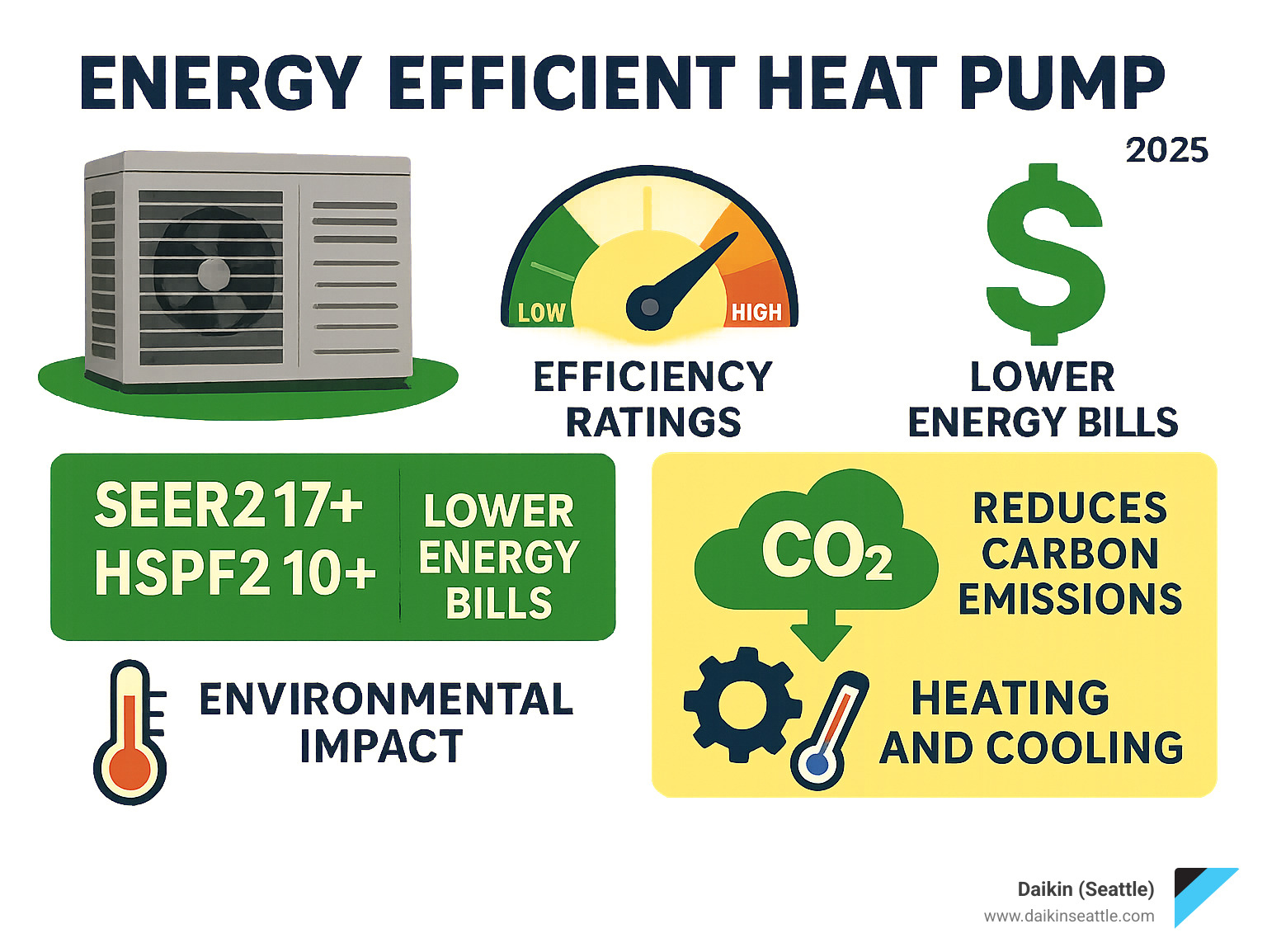
Basic Energy efficient heat pump vocab:
How Heat Pump Efficiency is Measured and Achieved
Instead of burning fuel, an energy efficient heat pump ingeniously moves heat. In winter, it extracts warmth from the outside air and brings it indoors. In summer, it reverses the process, pulling heat from inside your home and releasing it outdoors. This heat transfer method is inherently more efficient than creating heat, allowing a heat pump to deliver multiple units of heat for every unit of electricity it consumes.
This remarkable efficiency is achieved through advanced components like variable-speed compressors and smart inverter technology. To learn more about how these systems maximize energy savings, explore our insights on Power Efficiency in Cooling Systems.
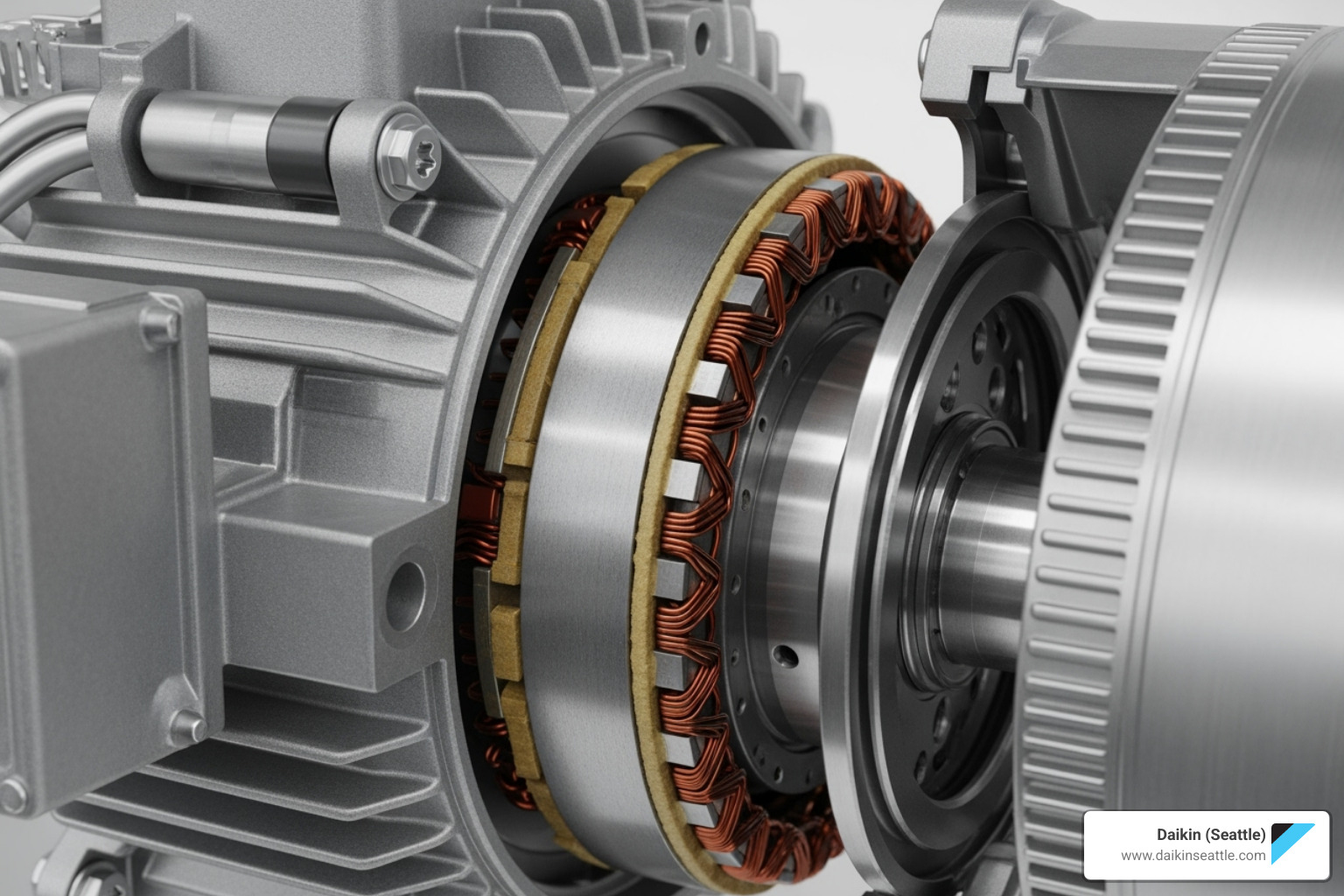
Decoding Efficiency Ratings: SEER2, HSPF2, and ENERGY STAR®
When shopping for a heat pump, two ratings tell the efficiency story: SEER2 and HSPF2. These updated 2023 standards reflect real-world performance.
- SEER2 (Seasonal Energy Efficiency Ratio 2) measures cooling efficiency. A higher number means it uses less electricity to keep you cool.
- HSPF2 (Heating Seasonal Performance Factor 2) measures heating performance. A higher number means more warmth for less energy.
For peak performance, look for SEER2 ratings of 15.2 or higher. The ENERGY STAR® label provides another layer of confidence, certifying that the heat pump meets strict energy performance criteria set by the U.S. EPA. For a deeper dive, check our guide on Heat Pump Efficiency Rating or browse models in the ENERGY STAR Certified Heat Pumps database.
The Technology Behind Top Performance
The heart of an energy efficient heat pump is its cutting-edge technology. The variable-speed compressor is a game-changer. Unlike older single-speed models that are either on or off, it adjusts its output to precisely match your home's needs. This means quieter operation, better dehumidification, more consistent temperatures, and significant energy savings.
This precise control is enabled by inverter technology—the brain that tells the compressor how fast to run. It prevents temperature swings and dramatically reduces energy consumption. Learn more about this breakthrough on our pages covering Inverter Technology in Air Conditioners and Decarbonization Inverter Technology.
Other key components include desuperheaters, which can capture waste heat to help heat your water, and the refrigerant, the fluid that circulates through the system to absorb and release heat.
The Compelling Advantages of an Energy-Efficient Heat Pump
Choosing an energy efficient heat pump means upgrading your entire home comfort experience. These systems deliver what traditional heating and cooling can't: consistent, year-round comfort with incredible efficiency. Imagine a home that's always at the perfect temperature, without the hot and cold spots that plague older systems.
The financial benefits are equally impressive, with monthly savings on your energy bills starting immediately. Perhaps most importantly, choosing an energy efficient heat pump is an act of environmental responsibility, reducing your home's carbon footprint while you enjoy superior comfort.
To see how these systems compare to other options, explore our guide to the Most Energy Efficient HVAC Systems.

What to Look for in an Energy-Efficient Heat Pump
When shopping for an energy efficient heat pump, focus on these key performance advantages:
- Electricity use reduction: You can see a reduction of up to 75% compared to traditional electric heating systems.
- Better dehumidification: During humid summers, these advanced systems keep your home feeling fresh and comfortable.
- Quieter operation: Thanks to variable-speed technology, many homeowners are surprised by how peaceful their new system runs.
- Consistent temperature: Enjoy steady, comfortable conditions in every room, without the temperature swings of older systems.
'Ultra' or high-performance models exceed standard efficiency requirements, featuring the highest SEER2 and HSPF2 ratings, even quieter operation, and eligibility for the most generous rebates. For more details, visit our page on Energy Efficient HVAC System features.
Environmental Impact of an Energy-Efficient Heat Pump
Upgrading to an energy efficient heat pump is one of the most impactful environmental decisions you can make for your home. Since heating and cooling account for nearly half of a home's energy use, this change is significant.
If you're currently using a gas furnace, the benefits are dramatic. Research shows that switching from a gas furnace to an electric heat pump reduces heating-related carbon emissions by 40% on average by eliminating the direct burning of fossil fuels in your home. This supports a lower reliance on fossil fuels and contributes to cleaner air. As our electrical grid incorporates more renewable energy, the environmental benefits of your heat pump will only grow.
This shift is part of a larger movement toward sustainable living. Learn more in our coverage of HVAC Technologies Seattle and review the 2022 study on carbon reduction for detailed analysis.
Finding the Perfect Heat Pump for Your Climate and Home
Selecting the right energy efficient heat pump requires matching the system to your home's specific needs and your local climate. With today's technology, there is a solution for every home, from a historic house with no ductwork to a modern home with an existing HVAC system. Our guide on Choosing the Right HVAC System is a great place to start.
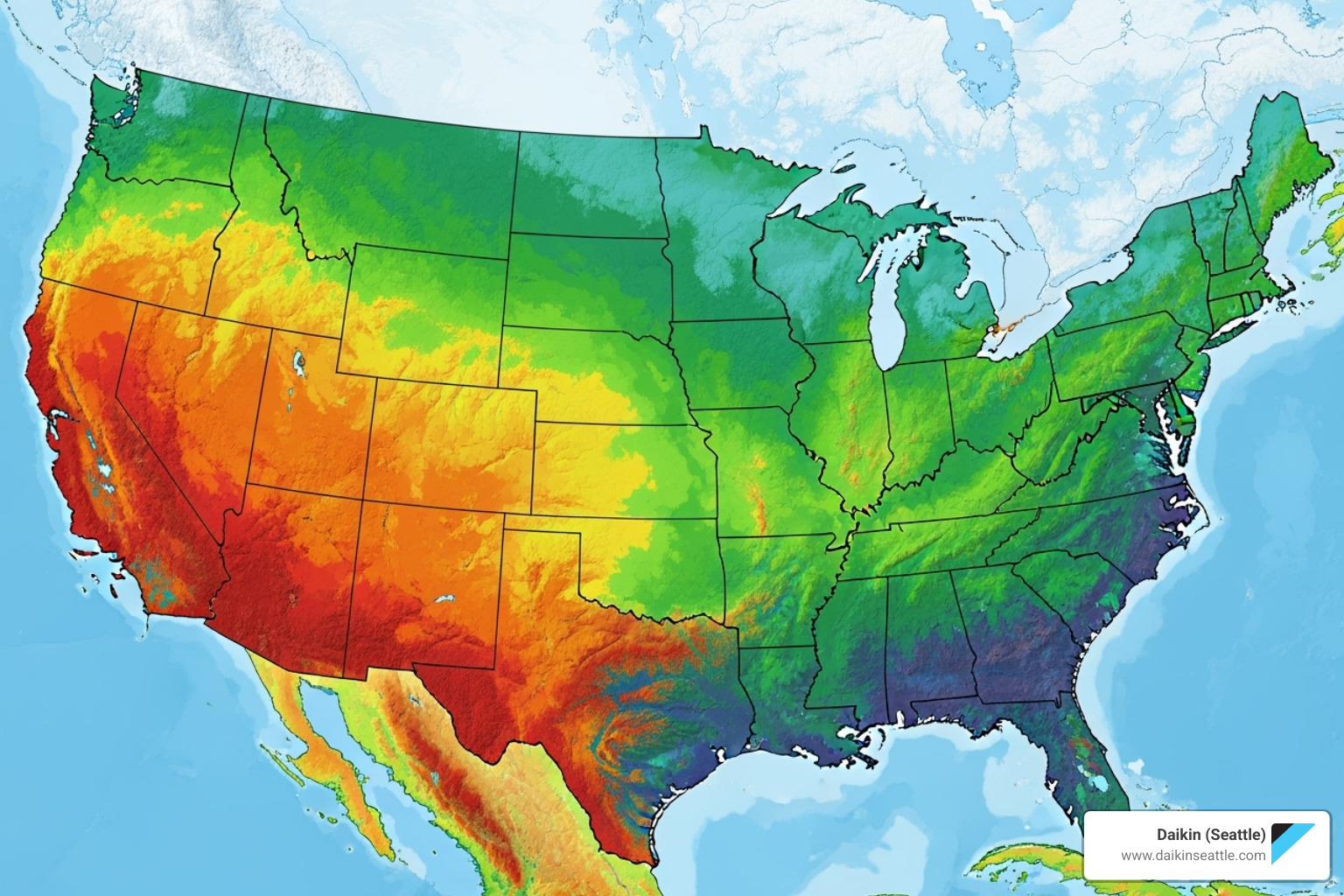
Here's a quick comparison of the main heat pump systems:
| System Type | Pros | Cons |
|---|---|---|
| Ducted | Whole-home heating/cooling, uses existing ducts | Requires ductwork, potential energy loss through ducts |
| Ductless | Zoned comfort, no ducts needed, easy install | Individual units in rooms, may not cover whole home |
| Geothermal | Highest efficiency, stable temps, long lifespan | High upfront cost, complex installation, ground disturbance |
System Types: Ducted, Ductless, and Hybrid
- Ducted systems are traditional workhorses that use existing ductwork to deliver whole-home comfort, making them a seamless upgrade for homes with a previous furnace or central AC.
- Ductless mini-split systems are brilliant for homes without ducts or for homeowners who want zoned temperature control. Individual indoor units are installed in specific rooms, offering whisper-quiet, flexible, and highly efficient heating and cooling. Explore our Heat Pump Solutions Seattle to see what works best in our climate.
- Dual-fuel or hybrid systems pair an energy efficient heat pump with a gas furnace. The system intelligently switches between the two, using the hyper-efficient heat pump in mild weather and the powerful furnace in extreme cold.
Sizing and Climate Considerations
Correctly sizing your energy efficient heat pump is critical. An undersized system will struggle to keep up, while an oversized one will cycle on and off, wasting energy. A professional Manual J load calculation is the only way to ensure a perfect fit. This process analyzes your home's layout, insulation, windows, and local climate to determine the precise heating and cooling requirements.
Modern cold-climate models have revolutionized performance in cooler regions, engineered to extract heat efficiently even when it's frigid outside. Many can operate effectively down to 5°F or lower. However, having a backup heat source—like electric strip heaters or the furnace in a dual-fuel system—is wise for ensuring comfort during extreme cold snaps. You can learn more about your region by checking the Department of Energy climate zones.
Air-Source vs. Ground-Source (Geothermal)
- Air-source heat pumps, the more common type, transfer heat between your home and the outdoor air. They are relatively straightforward to install and have become remarkably efficient, even in the Pacific Northwest.
- Ground-source or geothermal heat pumps tap into the stable temperature of the earth via buried loops. This makes them incredibly efficient and durable (loops can last 50+ years), but the required excavation results in a higher upfront investment.
Geothermal systems can be water-to-air, working with traditional ducts, or water-to-water, which are ideal for radiant floor heating. The best choice depends on your property and goals. For personalized guidance, explore our Daikin HVAC Solutions Seattle.
Smart Ownership: Rebates, Controls, and Long-Term Care
Choosing an energy efficient heat pump is the first step. Maximizing your investment comes from understanding available incentives, using smart technology, and performing proper care. This partnership ensures your system takes care of your comfort and energy bills for years to come.
When you make this investment, you're embracing a future of lower energy bills and reduced environmental impact. For homeowners in our area, our Heat Pump Installation Seattle Complete Guide covers the process from start to finish.
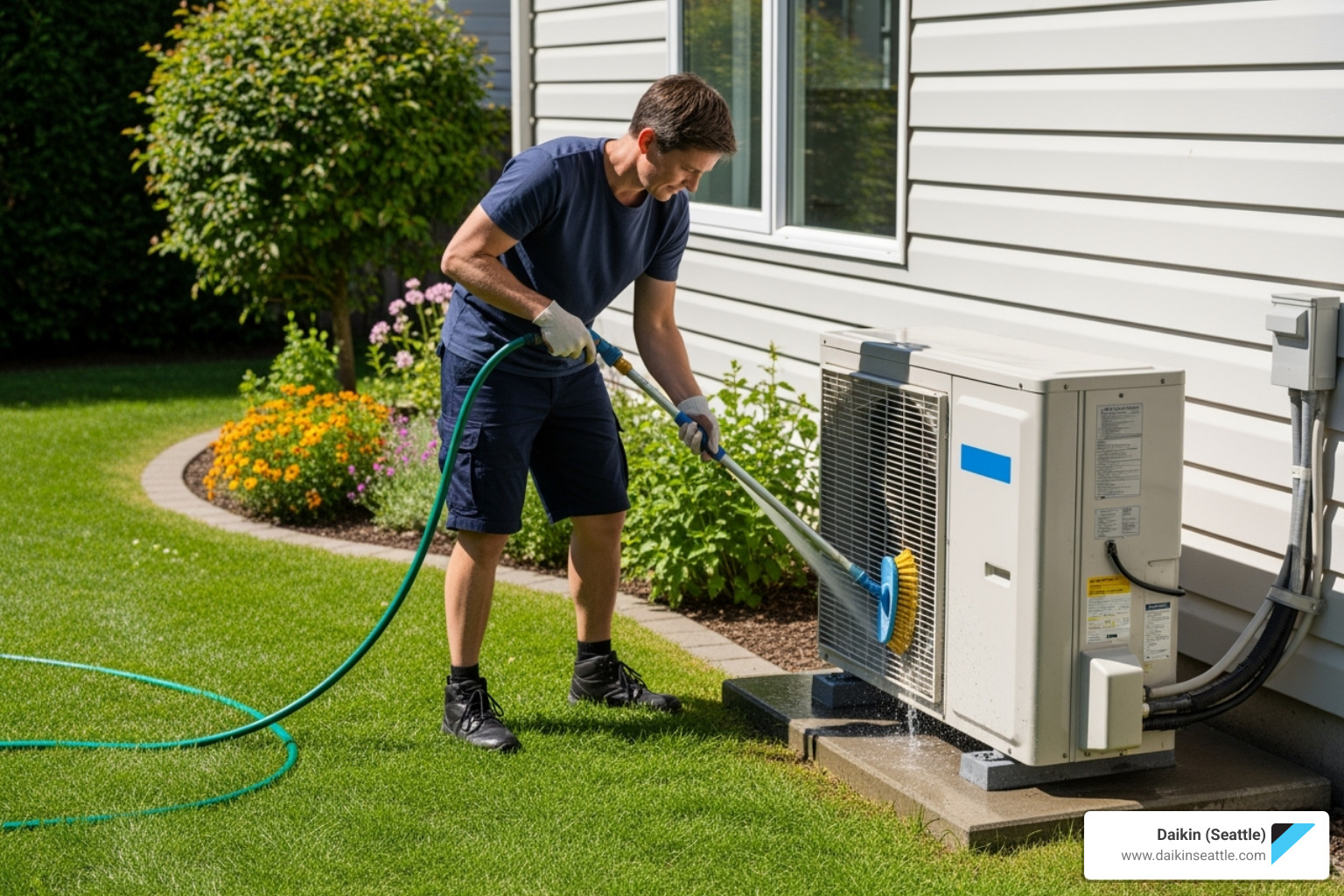
Financial Incentives: Rebates and Tax Credits
Upgrading to an energy efficient heat pump has never been more financially attractive. The federal government offers a significant tax credit, covering a percentage of your total heat pump purchase and installation costs. This credit can also apply to necessary supporting modifications like electrical panel upgrades or insulation improvements.
State and local utility rebates can add another layer of financial relief. These incentives vary by location but can be quite generous. In Canada, various provincial programs also offer substantial support. The Database of State Incentives for Renewables & Efficiency (DSIRE) is an excellent resource for finding incentives available in your specific area.
Enhancing Efficiency with Smart Thermostats
Pairing your energy efficient heat pump with a smart thermostat is like giving your home a brain. These devices learn your preferences to maximize comfort while minimizing energy use. You can control your system remotely via smartphone, create schedules, and monitor energy usage. This helps your heat pump operate at peak efficiency, maintaining consistent temperatures and delivering improved comfort and savings.
Essential Maintenance for Peak Performance
Your energy efficient heat pump rewards good care with years of reliable service. Neglecting maintenance can lead to decreased performance and higher energy bills.
- Clean or replace air filters regularly. Dirty filters restrict airflow, forcing your system to work harder. Check them monthly and replace every 1-3 months.
- Keep the outdoor unit clear of debris. Leaves, grass, and dirt can block coils and reduce efficiency. Keep the area around the unit clear.
- Schedule professional annual check-ups. A qualified technician should inspect refrigerant levels, clean coils, check electrical connections, and lubricate moving parts. For ducted systems, they can also inspect for leaks.
This annual investment, combined with your regular care, will keep your energy efficient heat pump providing reliable comfort for years. Our HVAC Preventative Maintenance page offers more detailed guidance.
Frequently Asked Questions about Heat Pump Efficiency
Considering an energy efficient heat pump brings up common questions. Here are clear, honest answers to help you make an informed decision.
At what temperature does an air-source heat pump's efficiency decrease?
While efficiency naturally decreases as it gets colder, modern cold-climate heat pumps are engineered to perform effectively well below freezing. Many models maintain high efficiency at 5°F and below, with some operating in sub-zero temperatures. For extreme cold snaps, the system uses a supplemental heat source (like electric heat strips or a backup furnace in a dual-fuel system) to ensure your home stays warm.
What distinguishes 'Ultra' or high-performance models from standard ones?
'Ultra' or high-performance models represent the best available technology. They feature the highest SEER2/HSPF2 ratings, advanced variable-speed inverter technology for quieter operation and superior comfort, and are built with higher-quality components for improved durability. They also typically qualify for the most generous rebates and incentives.
How long do heat pumps typically last?
A well-maintained air-source energy efficient heat pump typically lasts 10-15 years, comparable to traditional HVAC equipment. Proper installation by a qualified professional and regular annual maintenance are the most important factors in maximizing its lifespan. Geothermal systems are even more durable; the indoor components last over 20 years, and the underground loops can function for 50 years or more.
Your Partner for an Energy-Efficient Future
Choosing an energy efficient heat pump is a smart investment in your home's future—delivering significant cost savings, superior comfort, and eco-friendly living. You'll enjoy lower utility bills and perfectly consistent temperatures year-round, all while reducing your carbon footprint and contributing to cleaner air in our Pacific Northwest communities.
The future of home climate control is electric and efficient, and at Daikin, we are leading the charge. Our commitment to innovation is on full display at our unique Pacific Northwest Daikin Experience Center in Seattle. Here, you can interact with our cutting-edge heat pump and inverter systems to understand how they can transform your home.
We specialize in creating customized solutions for homes across Seattle, Tukwila, and the Pacific Northwest. Whether you need single-room comfort or a whole-home system, our team has the expertise to design the perfect solution for you.
Ready to experience the difference an energy efficient heat pump can make? We invite you to explore multi-zone HVAC systems in Seattle and find how our advanced solutions can deliver unparalleled comfort and efficiency, customized for your space.
Let us be your trusted partner in building a more comfortable, efficient, and sustainable future for your home.
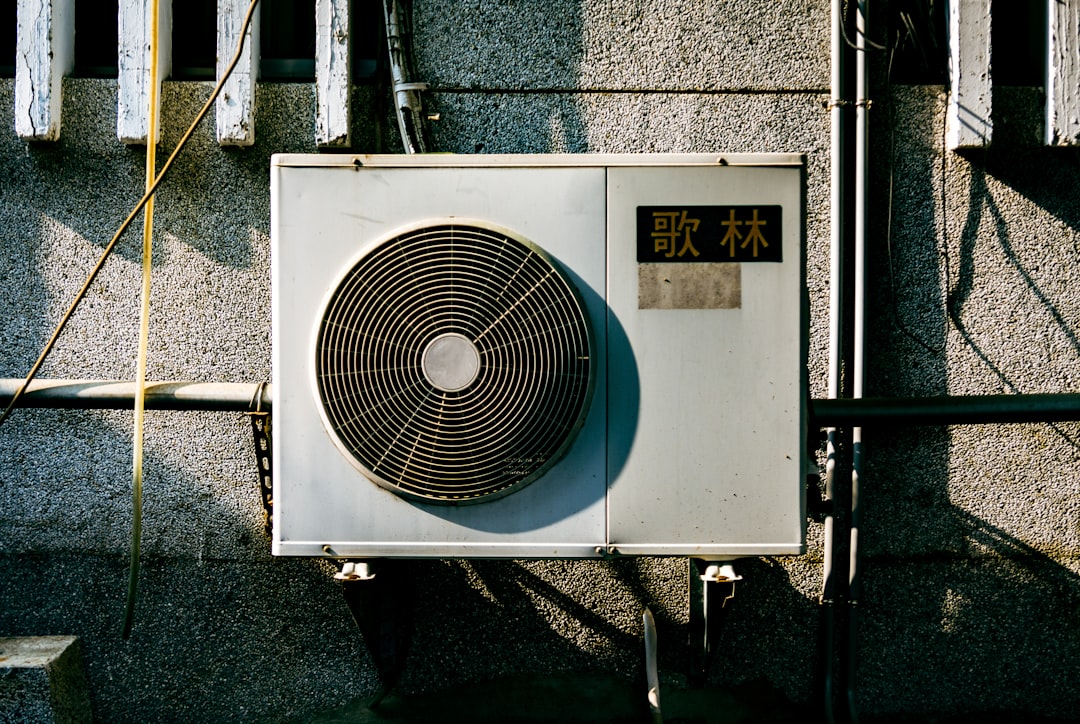
Schedule a Visit

your individual indoor comfort needs

products firsthand

with an authorized Daikin Dealer
.webp)

.webp)

.svg)
